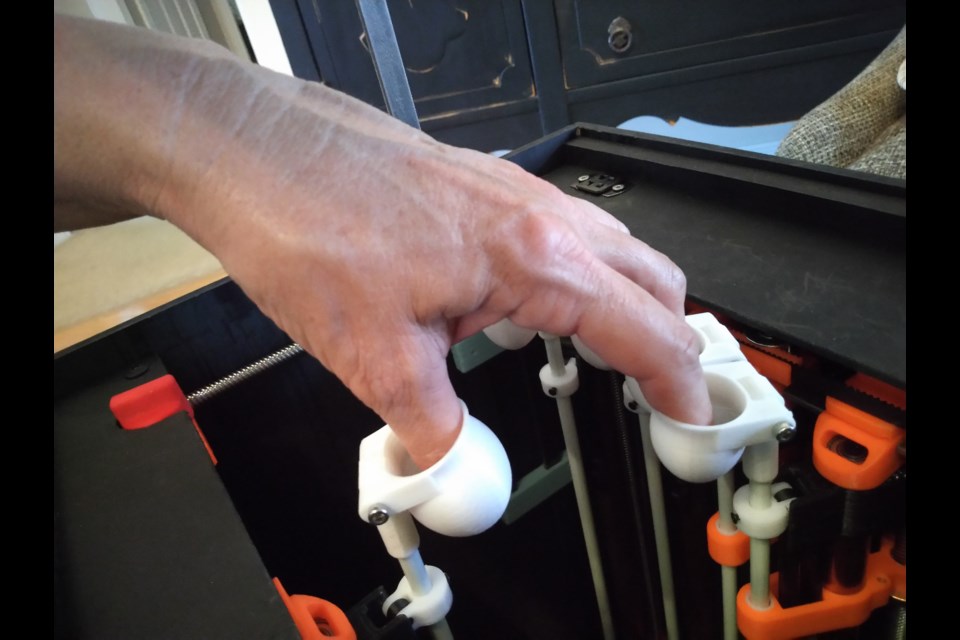Nearly a decade after he first came up with the idea for a unique device to help stroke patients regain hand function, Vineet Johnson is finally moving his product closer to commercialization.
In 2013, the Sudbury physiotherapist and neuroscientist created MyHand, which guides users through a series of exercises designed to stimulate new pathways in the brain
Clinician and hospital versions are already available, and Johnson and his team at iRegained are now fundraising so they can put a commercial iteration on the market.
But it's been a long road to get here.
“Today, we are a company that has come through enormous struggles. The ups and downs are normal, and it's an everyday process,” Johnson said during a virtual presentation on Jan. 19. “So understand you're going to have problems, but also understand you have phenomenal partners.”
Those partners include NORCAT, the Sudbury innovation centre that accepted iRegained into its 2019 Pitch competition, where the company took home the Judges’ Choice Award and secured $250,000 in seed funding.
Or The Foundry incubation hub at Laurentian University, or Cambrian College, which each had tools to help iRegained make various prototypes of MyHand at different stages of the project.
They and about a dozen other organizations and funding agencies make up Sudbury's business startup ecosystem, all of which work together to help new entrepreneurs get their ideas up and running.
“It is this society, it is this infrastructure, and this ecosystem that allows a company like iRegained, which is very dependent on a lot of these resources, to thrive,” Johnson said.
“Not survive – thrive.”
Johnson shared his experience during this year's Innovation for a Greater Sudbury, hosted annually by The Foundry, which showcases examples of innovation and entrepreneurship taking place throughout the city.
This year's event focused on the services and support available through the city's growing business startup ecosystem.
To find the right organizations that can help, Alicia Woods suggested entrepreneurs should “reach out, ask, inquire, create partnerships and collaborations."
That's how she began in 2013 when she launched Covergalls, a company that designs and sells industrial workwear specifically designed for women's bodies.
Inspired by her own experience working underground in mining, Woods knew that women needed properly fitting coveralls so they could work safer, more comfortably, and with better functionality.
“I've had the opportunity to work with all of these great organizations and companies and they really helped me in the beginning because you have an idea, but what (do you do) with that idea? Where (do you) start?” Woods said.
“And here in Sudbury, we're blessed to have so many different organizations that are there to support you."
Working with Cambrian College's internship program, Woods recruited business and marketing students who offered their insight and assistance while gaining hands-on work experience. NORCAT, meanwhile, took some coveralls for use at their test mine in Onaping.
A big leap forward came when nickel miner Vale signed on as a partner, enabling employees to test and trial the garment to ensure it met industry safety requirements. The company later ordered 50 pairs of Covergalls for its staff at Voisey's Bay mine in Labrador.
When business slowed during the onset of COVID-19, Woods realized she needed to be flexible to keep her company up and running.
So she partnered with local seamstresses to produce cloth face masks, later donating proceeds from sales to local long-term care facilities, which used the money to procure personal protective equipment (PPE).
“During that time is when I realized the importance of supporting the local community,” she said. "As organizations and as companies, we need to do our part in supporting each other, whether it's procuring goods or services from companies here in the area.”
Much of this support system wasn't in place yet when Gus Minor first started building Sofvie.
The company's software gathers data collected throughout an organization, and the resulting analytics can be used to minimize risk, making workplaces safer.
Minor felt compelled to create the technology following the deaths of loved ones from occupational hazards in the mining industry.
“The ecosystem that’s now available in Sudbury is tremendous,” Minor said.
“If you would have asked me 20 years ago if this was a place to start a business, I would have probably advised otherwise. Especially in technology, for me, it's either you create your opportunity or you leave,” he added.
“It's very refreshing today to see that there's so many opportunities with companies being started in Sudbury.”
Since then, he has tapped into the ecosystem to access funding, create industry partnerships, and fulfill labour needs.
Minor estimated Cambrian College and Laurentian University have supplied 90 per cent of Sofvie's workforce, many of whom began as students.
Using locally developed talent has not only enabled the company to “hit the ground running,” he said, but it also provides graduates with job opportunities post-graduation.
He remains optimistic about Sudbury's future as a business-friendly city that values entrepreneurship and puts resources in place to properly support local startups.
“When it comes to building something new and putting it out to the world, this is the place to do it,” he said.
“And I think that, with the momentum that we're building now, we've got a really bright future ahead in building Sudbury up to be something beyond the mining industry.”




